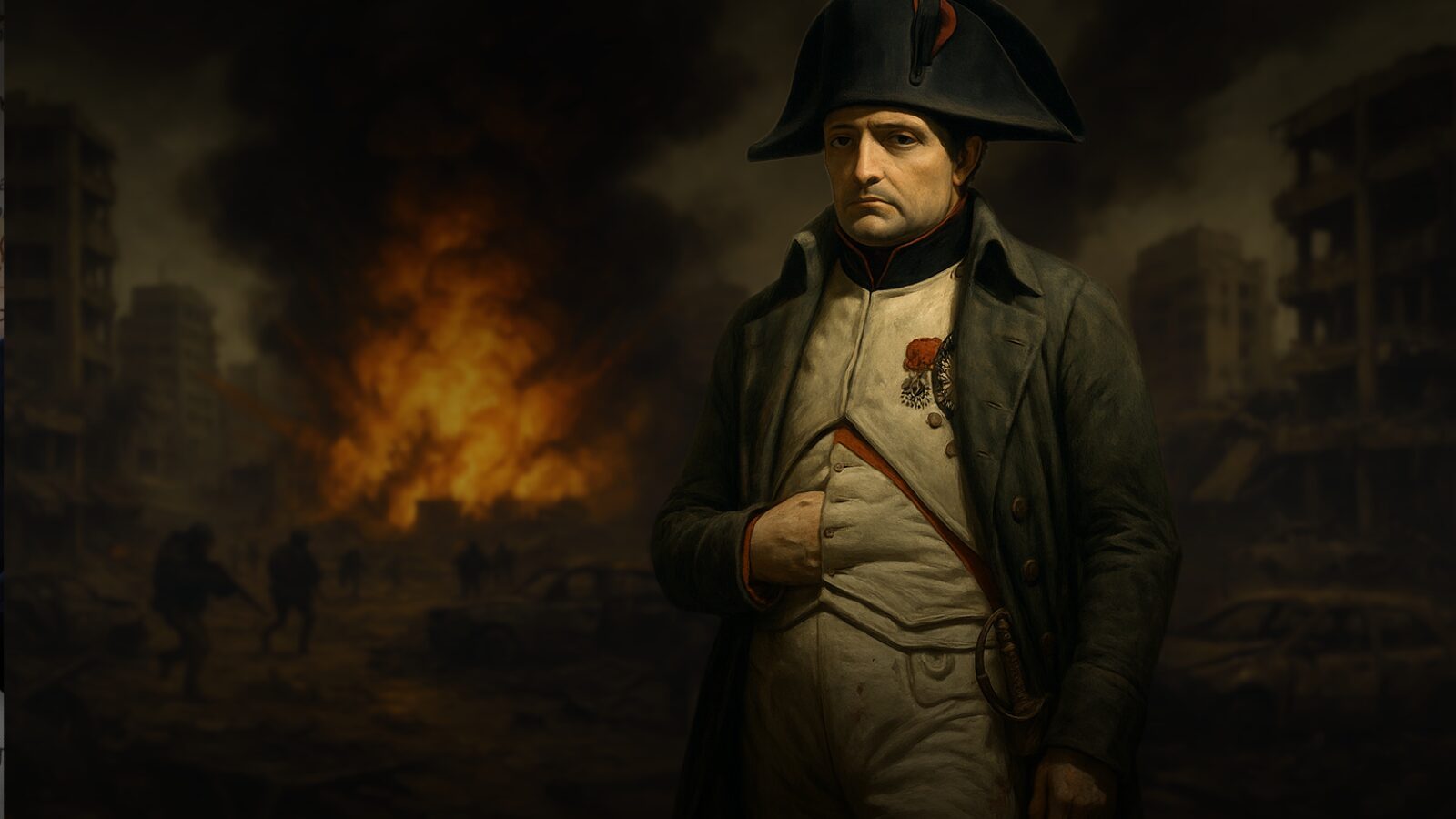Publications
Special Publication, October 14, 2025
From the distance of the 19th century, Napoleon Bonaparte observes the Swords of Iron war. His motto in conducting wars is victory at any cost, and he moves the test of victory from the subjective realm of opinion to the objective realm of establishing facts. Among his insights are when the enemy is in flight, either a bridge of gold should be built or a wall of steel. Although Napoleon does not elaborate on strategy, he offers in this context a piercing observation: “Strategy is the art of making use of time and space.”
From the distance of the 19th century, Napoleon Bonaparte looks with interest upon the Swords of Iron war.[1] His first address is to Prime Minister Benjamin Netanyahu and to Chief of Staff Eyal Zamir: “It was not the legions that crossed the Rubicon, but Julius Caesar.” The army enters the battlefield and is tested there, but the “crossing of the Rubicon” depends on the stance of the political-military leader, who commits himself to it with his very soul. Napoleon’s lesson is not a quest for military genius as he claims that “Military genius is a gift from God, but the most essential quality for a general is firmness of character and the resolution to conquer at any price.” Hence, he remarks dryly that his armies did not stop winning, except when he ordered them to cease fighting.
Napoleon’s motto in managing wars is victory at any cost. The test for such victory is simple in its brilliance, that of not leaving the enemy any advantage, not even that of an opinion. The meaning is that Napoleon recognizes the importance of consciousness in shaping the perception of victory. He makes the effort to transfer the test of victory from the subjective realm of opinion to the objective realm of facts on the ground. In his view, there is no such thing as a “perceptual victory,” a victory on points, or a “victory image” produced by an IDF spokesperson. The only “image of victory” is a knockout victory: the adversary lying helpless on the battlefield, or having laid down his arms and fled for his life.
Accordingly, Napolean’s formula for proper military command is unequivocal and include ability, determination, vigor, courage, firmness, initiative, knowledge and understanding of war, quick assessment of the situation, rapid decision-making, fighting spirit and strength of character, which are the traits of good generals.
The categorical imperative in combat management and decision in battle is seeking contact. Napolean said that the bayonet was the weapon of the brave and the chief tool of victory and that “in war, as in love, we must come into contact before we triumph.”
Napoleon’s insights are far-reaching and astonishingly sensitive. He admits that the dead are the only loss that cannot be recovered, and suggests to build a bridge of gold before a fleeing enemy, or a wall of steel. Furthermore, after victory, there is no longer an enemy, but only human beings.
Napoleon thus proposes a sharp distinction between enemies and former enemies. A fleeing enemy is a former enemy. A former enemy is a human being. The approach toward him must be humane. A bridge of gold or a wall of steel—these are outcomes devoid of resentment or vengeance.
It may be assumed that if Napoleon were with us, he would have supported the IDF’s efforts to avoid harming noncombatants as much as possible—more from pragmatic considerations of utility than from moral principles. He would have also vigorously agreed to the hard line taken by Lt. Gen. (res.) Gadi Eisenkot: “An 18-year-old who enlists in the IDF is a soldier, and not ‘everybody’s son,’ and he must give his life to protect us.”
Napoleon waged his wars without being conscious of the concept of “strategy.” He discovered the concept of strategy only during his exile on Saint Helena, from studying the book of Archduke Karl of Austria, who treated “strategy” as “grand tactics.” Nevertheless, and even though Napoleon does not explicitly comment on strategy, he offers one insight, rare in its sharpness: “Strategy is the art of making use of time and space. I am less concerned about the latter than the former. Space we can recover, lost time never.”
Napoleon sees himself as a pupil of Julius Caesar and Hannibal. Caesar adhered to the same principles as Hannibal: to keep his forces united, remain invulnerable at every point, strike swiftly at decisive moments, rely on the fighting spirit of his troops and the renown of their weapons, instill fear in the hearts of the enemies, and employ political measures to maintain the confidence of his allies and the obedience of the peoples he had conquered.
Anticipating modern mechanics, Napoleon proposes a new principle: The power of an army, like momentum in physics, is the product of its mass and its speed. A century later, with the advent of tanks, Napoleon’s idea evolved into the Blitzkrieg doctrine—a rapid, armored war supported closely by dive bombers.
But Napoleon did not deceive himself. As his contemporary, the military theorist Carl von Clausewitz, concluded, the battlefield is the realm of chance and the unexpected. Napolean observes that war is never absolute, and that victory often depends on fleeting moment of insight. He notes that the Battle of Austerlitz would have been lost had he attacked six hours earlier, saying that “in war there is but one favorable moment; the great art is to seize it.”
With a clear-eyed view of war’s risks, Napoleon repeats that war is a gamble that nations should stake as little as possible on.
[1] This essay is based on the Hebrew translation of the book Napoléon Bonaparte: Comment faire la guerre, trans. Reuven Miran and Aviva Barak-Humi (Nahar Books, 2019).



